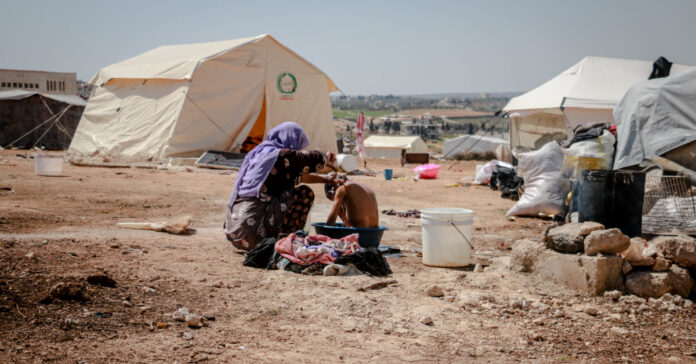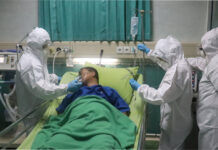
It seems the world is flooded with refugees. The UN estimates there are 103 million “displaced people,” with about a third 18 or younger.
So what makes someone become a refugee? In many cases, they are looking to avoid death or persecution. This could be death or persecution by a government, death from gangs or cartels, or death because of a war or famine. In other cases, they are looking to improve their economic situation. An economic collapse can cause starvation, a lack of medical treatment, or loss of housing, so those who can leave in search of something better. When so many Venezuelans crossed the border into Columbia, for example, it was often in search of work or food.
Many times, refugees are driven out by an enemy. Seventeen million Ukrainians fled when Russia attacked, although more than three-quarters have headed back to the Ukraine, if not to their homes. Undoubtedly, some will flee again if the war goes badly. Many of the refugees that have headed into Europe from places like Syria and the South Sudan in the past few years are fleeing war or occupation by their enemies.
Don’t Become a Refugee
When you become a refugee, it’s like going from the frying pan into the fire. You flee a situation you know is bad to one you hope is better. In doing so, you leave behind everything you have done, everyone you know, and all that you own to put yourself in the hands of a country or organization you hope is better than the one you left.
I know I’m not the first to say it, but hope is not a strategy.
Being a refugee means hitting the road and leaving your area of operation. It may be a move inside your country or a move to another country. Often, the trip is not an easy one and may include death and assault, robbery, or rape. Worse yet, you may not be any better off where you get there.
If you arrive safely at your intended destination, you generally end up in the (hopefully) well-meaning hands of a government or NGO that says they want to help, but have limited resources. Their idea of helping might be to assign you a cot in a military base, school gymnasium, or a tent. It’s better than dying, but if your stay turns into anything longer than a few days, it will not be an enjoyable situation. Plus, in most cases, you will be under the control of your host and no longer have any freedom. Once they have you, they may not let you leave.
In Europe, most refugees or “migrants” end up living in slums with other refugees from their old country or ethnic group. They don’t learn the local language or assimilate. The adults can’t find employment. The locals hated the refugees. Maybe the younger generation will have a chance, but many won’t take it.
Avoid Refugee Camps
Let me clarify that I am not talking about using “warming centers” or Red Cross halls where people are welcome when the power goes out or the hurricane strikes. I’m talking about refugee centers geared towards those that leave one country and enter another. The same warning applies, however, to post-SHTF refugee centers that house (or warehouse) and feed thousands of people who are unable to survive on their own. Think of the FEMA camps as an example.
I’m not here to promote or debunk the idea of FEMA camps, but whether large locations already exist to house refugees or malcontents, I expect there are plans to create them on the fly and policies and procedures ready to be put into effect. Look how quickly China threw together COVID housing units where they shipped off tens of thousands of their citizens.
How to Avoid Becoming a Refugee
Now that you know why you shouldn’t become a refugee, let’s talk about how to avoid it after a SHTF situation.
Practice Self-Reliance
Many people will end up in a “refugee center” or FEMA camp because they cannot survive on their own. In a few days, their food will run out, the toilets will stop flushing, the house will grow cold, and most people won’t know what to do. A large percentage of the population will follow the directions on the radio or texts on their phone and head to a central location where they can get food and water.
At first, the National Guard will hand out MREs and bottled water, but when it becomes clear that things will not be going back to normal in a week or two, they are going to want to evacuate you to somewhere safe for your own good. When you hear “it’s for your own good,” consider it a sign you should leave and never come back. Make an excuse, like wanting to get the other members of your family, and walk away before they grab you and force you to evacuate.
If you are a prepper, you should have the basics like food, water and shelter covered. That alone should be enough to keep you from lining up for supplies and getting on the radar of the do-gooders who want to take you somewhere “safe.” Maybe they mean well and things in your area will be dangerous, but if you have guns, then you can help assure your own safety.
Refuse to Evacuate
If some government entity sends people around to evacuate an area, you need to keep a low profile and avoid them. Hopefully, they will drive through with loud speakers encouraging you to come out rather than searching house-to-house or using thermal imaging to identify where people are hiding. (If you fear the latter, stay in the basement so there’s a big chunk of dirt between you and the thermal imager.)
If they track you down or dig you out, so to speak, refuse to go. There is a long history of people refusing to evacuate as a hurricane heads towards them and of homeowners staying on the property to protect it from a forest fire. If you appear firm and resolute, there’s a good chance they’ll let you stay. They may give you all sorts of doom and gloom stories and warn you to write your social security number on your arm with a Sharpie, but don’t let that intimidate you.
I’m not suggesting you get in a shootout with the National Guard, but argue, complain about them violating your rights, and do whatever you can to convince them it would be easier and safer to leave you behind. If necessary, run away and hide. They are probably on a schedule and have better things to do than chase you down.
Be Prepared to Fight
If the United States is invaded, exercise your patriotism and fight back. If you are too old to join the military, become a partisan like the underground in France during WWII. Join or create a local militia of like-minded folks and defend your corner of the country. If your location is overrun, become a guerrilla fighter or support those that are. Attack the enemy’s patrols, disrupt their supply chains, and act as a forward observer to call in artillery or air strikes from our military. Look at the everyday Ukrainians who have contributed to the war effort by repairing damaged tanks and trucks, operating drones, building bunkers, assisting with logistics, and acting as spies. Even firefighters and electricians have become heroes.
Don’t bother running off to Canada. Anyone who invades us will turn their attention northward or might even start there and attack us from that direction.
If it’s a civil war, pick the side that you appear to be politically aligned with and fight for them. Keep in mind that if you’re the only conservative on your block in a liberal city, you might be in a difficult position.
If its raiders, fight like your life depends upon it, because it probably does.
Maintain Your Mobility
If the catastrophe is only in your area, your best bet may be to leave the area under your own power. A motorized bugout method is the best option. Walking is the worst. We’ve all seen images of refugees carrying shopping bags trudging along the highway. You don’t want to be in that position.
For example, if you live outside a city that has just had an outbreak of an infectious disease that is killing thousands, you may want to head somewhere far away and with a lower population density. Walking will not get you very far. If you drive, you can cover hundreds of miles a day, assuming the roads are open. You can also carry more survival stuff with you. In that scenario, however, you have to be careful that the CDC or state health department isn’t putting up roadblocks to keep contaminated people from spreading the disease elsewhere. Keep up with the news and leave before it is too late.
We’ve covered bugging out before, so I won’t go into great detail. Read this article or this one for more details.
Try to Avoid Going Broke
In an economic collapse or a period of hyperinflation, it’s going to be almost impossible for your salary or your bank account to keep up with the cost of goods. In fact, there might come a time when there are no goods available or when the dollar becomes valueless. What are you going to do when a $100 bill won’t even buy a gallon of gas?
This is where being self-sufficient and having stored goods comes back into play. If you don’t need anything, being broke is survivable.
But no one is ever perfectly prepared. Eventually, you will need something, so if the monetary system collapses, try to have something else valuable you can use to barter, either goods or skills. Do you think eggs are expensive now? Wait until they become one of the few foods sources available locally. Better yet, think how valuable garden seeds or baby chicks will be. I recommend this excellent article on barter for preppers.
Post Evacuation
Let’s imagine you live somewhere with 20 people per square mile and 15 of those people evacuate to some central location where they line up to have slop poured into their bowls twice a day and have to keep their valuables under constant watch so another refugee doesn’t steal them. Having those who are unprepared, elderly, or ill out of the way is an advantage to you. They won’t be hunting in the same area you are, meaning less completion for game. They also won’t be your responsibility and a burden to you. Their houses may even have things you can use, even if it’s just an extra can of gasoline in the garage or a stack of firewood out back.
My point is, let the other guy evacuate. Stay in the area you know with all your preps and other resources. Avoid refugee centers unless you have no other option.







